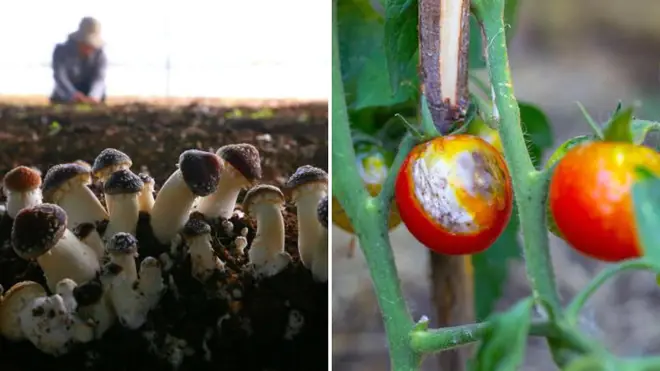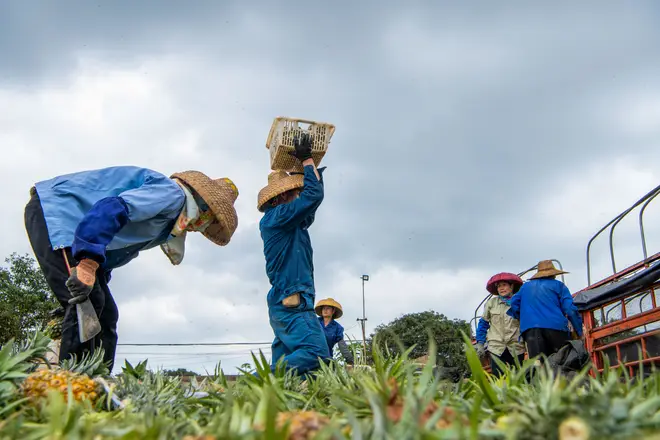
Fungus attacks could threaten the global food supply. Picture: Getty/Alamy
By Kit Heren@yung_chuvak
By Kit Heren@yung_chuvak
3 May 2023
Rapidly spreading fungi attacks on crops and could threaten the world's food supply, leading to a potential "global catastrophe", scientists have warned.
The climate crisis and rising temperatures are worsening the impact of fungi on crops, as they have been able to move northwards at a rate of 7km per year since the 1990s, researchers claim
The wheat stem rust fungus, normally found in the tropics, has been reported as far north as England and Ireland.
Fungi are already the biggest destroyer of crops, and many have developed resistance to fungicide.
Farmers around the world already lose between 10% and 23% of their crops to fungi, according to the report, published in the journal Nature.

Rapidly spreading fungi attacks on crops and could threaten the world's food supply, leading to a potential "global catastrophe", scientists have warned.
The climate crisis and rising temperatures are worsening the impact of fungi on crops, as they have been able to move northwards at a rate of 7km per year since the 1990s, researchers claim
The wheat stem rust fungus, normally found in the tropics, has been reported as far north as England and Ireland.
Fungi are already the biggest destroyer of crops, and many have developed resistance to fungicide.
Farmers around the world already lose between 10% and 23% of their crops to fungi, according to the report, published in the journal Nature.

Fungus are already a prolific destroyer of crops. Picture: Getty
Professor Sarah Gurr of the University of Exeter, who is a co-author of the report, said the hit TV show The Last Of Us, in which fungi infect humans, had brought the issue more into the public eye, the Guardian reported.
"While that storyline is science fiction, we are warning that we could see a global health catastrophe caused by the rapid global spread of fungal infections," she said. "The imminent threat here is not about zombies, but about global starvation."
Researchers said global warming could even increase fungi's heat tolerance, meaning they might even be able to infect warm-blooded animals and humans in the future.
Professor Eva Stukenbrock, at the University of Kiel in Germany, a co-author, said: "As our global population is projected to soar, humanity is facing unprecedented challenges to food production.
Professor Sarah Gurr of the University of Exeter, who is a co-author of the report, said the hit TV show The Last Of Us, in which fungi infect humans, had brought the issue more into the public eye, the Guardian reported.
"While that storyline is science fiction, we are warning that we could see a global health catastrophe caused by the rapid global spread of fungal infections," she said. "The imminent threat here is not about zombies, but about global starvation."
Researchers said global warming could even increase fungi's heat tolerance, meaning they might even be able to infect warm-blooded animals and humans in the future.
Professor Eva Stukenbrock, at the University of Kiel in Germany, a co-author, said: "As our global population is projected to soar, humanity is facing unprecedented challenges to food production.

Scientists compared the fungal threat to the hit TV show The Last of Us. Picture: Alamy
"We’re already seeing massive crop losses to fungal infection, which could sustain millions of people each year. This worrying trend may only worsen with a warming world.”
Across the five most important crops - potatoes, maize, wheat, rice and soya beans - infections destroy food that would fed hundreds of millions of people each year, researchers said.
Fungi are very resilient, and can remain viable in the soil for 40 years. They can also travel long distances - even between continents.
Prof Gurr said: "After tornadoes in America, you can see the spores have been sucked up and gone on long distance voyages".
Fungicides and the usual breeding methods to form disease resistance are no longer enough, the researchers said, because the fungi can get around them.
Political economist breaks down why food prices have soared
The authors said that planting seed mixtures that have a range of genes, rather than monocultures of a single strain, may provide some resistance to fungal attacks.
Read more: Hollywood star Keanu Reeves has newly-found fungus-killing compound named after him
Read more: What is Mucormycosis? How the 'black fungus' has affected Covid patients in India
The scientists are carrying out more research in a bid to tackle fungicide resistance, but are pushing for more funding to support their work.
Prof Gurr said: "If we don’t have enough to eat, malnutrition will kill us before we get anything like Covid-19.
"But our [research area] is absolutely penniless compared with every medical disease you could imagine.”
"We’re already seeing massive crop losses to fungal infection, which could sustain millions of people each year. This worrying trend may only worsen with a warming world.”
Across the five most important crops - potatoes, maize, wheat, rice and soya beans - infections destroy food that would fed hundreds of millions of people each year, researchers said.
Fungi are very resilient, and can remain viable in the soil for 40 years. They can also travel long distances - even between continents.
Prof Gurr said: "After tornadoes in America, you can see the spores have been sucked up and gone on long distance voyages".
Fungicides and the usual breeding methods to form disease resistance are no longer enough, the researchers said, because the fungi can get around them.
Political economist breaks down why food prices have soared
The authors said that planting seed mixtures that have a range of genes, rather than monocultures of a single strain, may provide some resistance to fungal attacks.
Read more: Hollywood star Keanu Reeves has newly-found fungus-killing compound named after him
Read more: What is Mucormycosis? How the 'black fungus' has affected Covid patients in India
The scientists are carrying out more research in a bid to tackle fungicide resistance, but are pushing for more funding to support their work.
Prof Gurr said: "If we don’t have enough to eat, malnutrition will kill us before we get anything like Covid-19.
"But our [research area] is absolutely penniless compared with every medical disease you could imagine.”
No comments:
Post a Comment